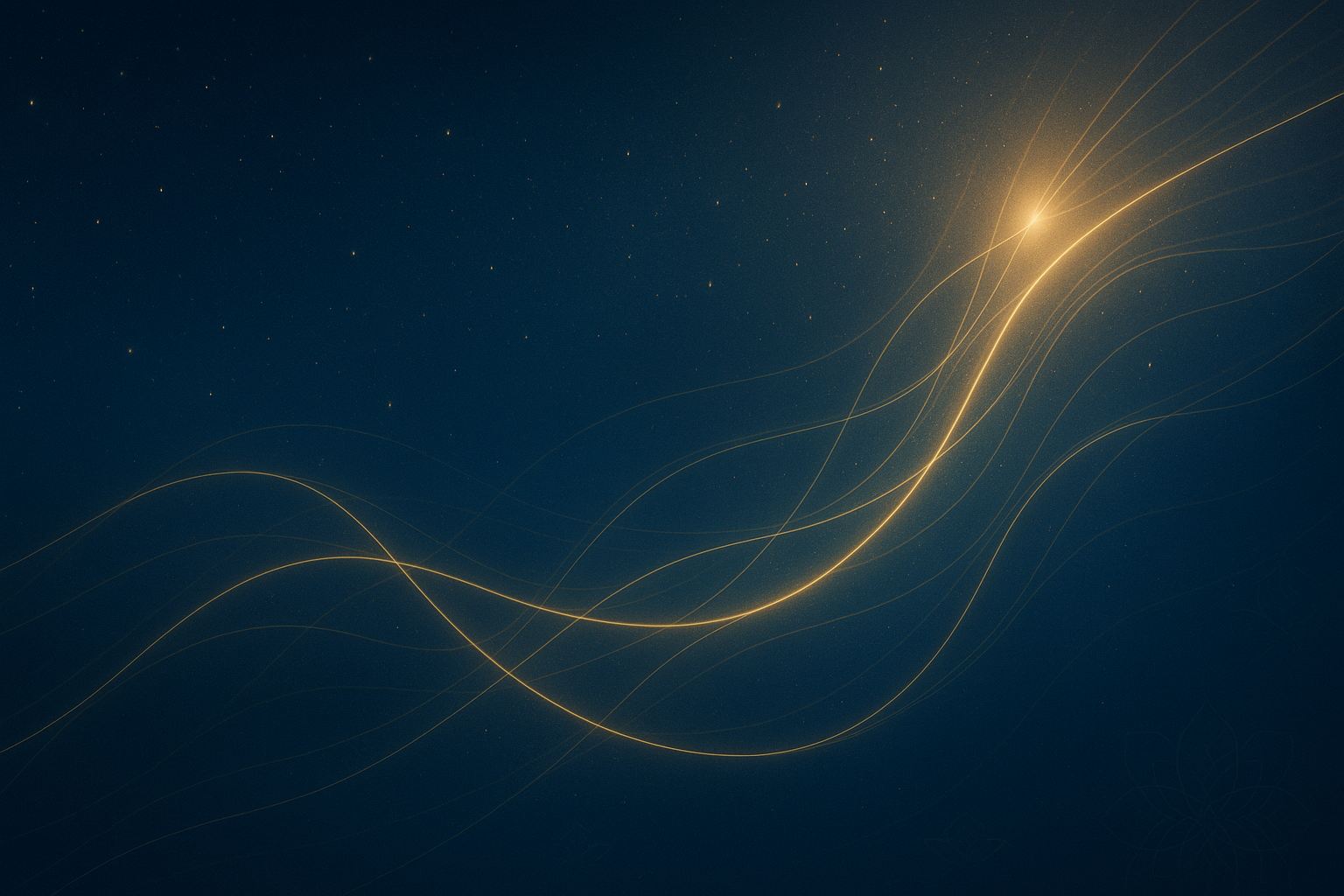Destiny – According To The Qur’an
Understanding Qadar — the metaphysics of will, time, and divine knowledge
In the Qur’an, destiny — or al-Qadar — is one of the six pillars of faith. Yet it is not a simple doctrine of fate, nor a surrender to mechanical predestination. It is a metaphysical architecture: a way of describing how divine knowledge, time, and creation interweave into a living pattern.
To believe in Qadar is to acknowledge that all things exist within God’s timeless knowledge and decree — yet that this divine order is not coercive, but relational. It includes human agency as a thread within the cosmic fabric.
1. The Meaning of Qadar
The Arabic word Qadar (قدر) carries layered meanings: measure, proportion, decree, determination.
It refers to the act by which Allah assigns everything its precise nature, limits, and timing. The Qur’an says:
“Indeed, all things We created with measure (bi-qadar).”
— Surah al-Qamar 54:49
This measure is not random. It signifies harmony — the balance by which existence is sustained.
Destiny, in this view, is the mathematics of being: everything is ordered by divine wisdom, each event fitting into a cosmic geometry known only to God.
2. Divine Knowledge and the Tablet of Decree
According to the Qur’an and Hadith, all events — past, present, and future — are inscribed in al-Lawh al-Mahfūz (the Preserved Tablet).
This is not a physical book but a metaphysical record, symbolizing God’s total awareness of all possibilities.
From the Qur’anic perspective, divine knowledge is not sequential. God is beyond time; He knows all events simultaneously, as a totality.
“He knows what is before them and what is behind them, and they encompass nothing of His knowledge except what He wills.”
— Surah al-Baqarah 2:255
Thus, God’s decree precedes creation, but it does not annul the moral weight of human choice. Rather, the decree includes human will as one of its elements.
3. Free Will and Divine Will — A Paradox of Participation
A central tension in the Qur’anic view of destiny is the coexistence of human freedom and divine determination.
“You do not will except that Allah wills.”
— Surah al-Insān 76:30
This verse captures the paradox: human will exists, but it is nested within the larger will of God.
The Qur’an does not dissolve this tension — it preserves it. For Islam, faith matures in the space between agency and surrender.
To act is to participate in divine unfolding. Each human intention (niyyah) is an echo of divine permission, and yet every individual is accountable, because intention itself is a test.
4. The Metaphysics of Time and Becoming
From a metaphysical lens, destiny in the Qur’an is not a static decree but a living process.
While all is known to God timelessly, creation unfolds within time — a sequence through which divine knowledge becomes visible.
This view aligns with a non-linear cosmology: God is the author of time, not bound by it.
What appears as future to us is already known, yet not forced.
It is like a film already written but still being projected — real, participatory, and filled with moral consequence.
5. Levels of Qadar
Islamic theology often describes four levels of Qadar:
- Knowledge (‘Ilm) — God’s absolute awareness of all that will be.
- Writing (Kitābah) — the inscription of all decrees in the Preserved Tablet.
- Will (Mashī’ah) — God’s permission for things to exist or occur.
- Creation (Khalq) — the actual bringing into being of what was decreed.
These levels depict a flow — from divine knowing to manifest being — showing that destiny is not mere prediction, but an active process of divine expression.
6. Destiny and Responsibility
The Qur’an repeatedly rejects fatalism.
Belief in destiny does not excuse inaction or sin:
“Whoever does good, it is for his own soul; and whoever does evil, it is against it.”
— Surah al-Jāthiyah 45:15
Thus, while everything is measured, the moral significance of action remains intact.
Human beings are free within the frame — like musicians playing notes on a score already composed, yet still responsible for how they perform it.
7. Destiny as Relationship, Not Determinism
In essence, destiny in the Qur’an is relational rather than mechanical.
It describes the intimacy between Creator and creation, where God’s decree is not an impersonal law but an unfolding dialogue between knowledge and will, mercy and test, purpose and patience.
Belief in Qadar teaches surrender — not as passivity, but as trust in divine orchestration.
To accept destiny is to accept one’s role in the cosmic narrative — to walk the path written, while still writing within it through choice and prayer.
8. The Spiritual Implication — Serenity through Surrender
The Prophet Muhammad (ﷺ) said:
“Know that what has reached you was never meant to miss you, and what has missed you was never meant to reach you.”
This encapsulates the metaphysical comfort of Qadar:
that destiny, once understood, is not bondage but peace — the serenity that comes from recognizing divine wisdom behind every unfolding.
✦ Final Insight
The Qur’an’s view of destiny is not a cold decree but a living covenant between time and eternity.
In Qadar, God’s omniscience and human choice coexist like mirror and reflection — inseparable, yet distinct.
Destiny, therefore, is not the negation of will, but the canvas upon which will acquires meaning.
To believe in Qadar is to say:
I act, knowing my act is known. I choose, knowing my choice is woven. I live, knowing my life is written — yet writing still.

Leave a Reply